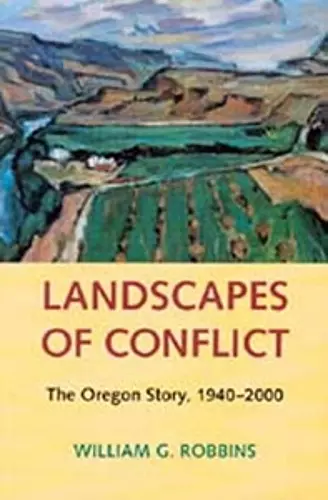Landscapes of Conflict
The Oregon Story, 1940-2000
Format:Paperback
Publisher:University of Washington Press
Published:25th Feb '10
Currently unavailable, and unfortunately no date known when it will be back
This paperback is available in another edition too:
- Hardback£43.00(9780295984421)

The second volume of a two-volume environmental history of Oregon by a pre-eminent scholar of Northwest and environmental history
William Robbins addresses efforts by individuals and groups within and outside the state to resolve inevitable conflicts between those most concerned for growth and perceived economic stability and those most concerned to preserve the quality of the state's natural resources and the environment in which its citizens live.
Post-World War II Oregon was a place of optimism and growth, a spectacular natural region from ocean to high desert that seemingly provided opportunity in abundance. With the passing of time, however, Oregon’s citizens — rural and urban — would find themselves entangled in issues that they had little experience in resolving. The same trees that provided income to timber corporations, small mill owners, loggers, and many small towns in Oregon, also provided a dramatic landscape and a home to creatures at risk. The rivers whose harnessing created power for industries that helped sustain Oregon’s growth — and were dumping grounds for municipal and industrial wastes — also provided passageways to spawning grounds for fish, domestic water sources, and recreational space for everyday Oregonians.
The story of Oregon’s accommodation to these divergent interests is a divisive story between those interested in economic growth and perceived stability and citizens concerned with exercising good stewardship towards the state’s natural resources and preserving the state’s livability. In his second volume of Oregon’s environmental history, William Robbins addresses efforts by individuals and groups within and outside the state to resolve these conflicts. Among the people who have had roles in this process, journalists and politicians Richard Neuberger and Tom McCall left substantial legacies and demonstrated the ambiguities inherent in the issues they confronted.
"This is, make no mistake about it, an important book. Oregon faces massive land-use and environmental issues, and this history of how we really got to where we are is relevant and predictive. Those who control how Oregon will go in the future need to read this book thoroughly.And that includes the people who have the most power..the voters."
* Salem Statesman Journal *"There is much to admire in [this] book: careful scholarship, brisk writing, and an obvious love and respect for Oregon's history and people. And many fascinating stories..Historians and environmentalists will be elaborating his themes, working from the borders of his achievement, for some time to come."
* The Oregonian *"[Landscapes of Conflict] is impressive, a work valuable for its sweep, relevant to many current concerns, and important for the understanding it can provide even to those with interests focused on areas far distant from Oregon."
* The Journal of American History *"Robbins brings a critical and moral clarity to his research and analysis that turns the specifics of one state's environmental conflicts into a synecdoche for broader struggles with modernity, capitalism, and ecological sustainability. He also adds significantly to a growing body of broad-minded, theoretically-informed scholarship about the Pacific Northwest, a region whose historiography has in the past tended toward either the provincially myopic or the gushingly exceptionalist. Robbins makes the case, in other words, that Oregon matters."
* H-NET BOOK REVIEW (Published by [email protected] (June 200ISBN: 9780295990439
Dimensions: unknown
Weight: 680g
416 pages